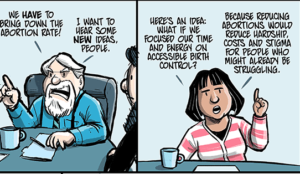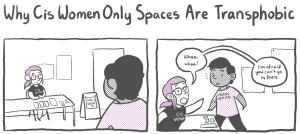Imagine you or your partner are pregnant.
Maybe it was unexpected, or maybe you had carefully planned for it. But instead of being able to celebrate, you’re overwhelmed with worry about how you can possibly have a child and still keep your job because there are no systems to ensure you can take time off to give birth and care for a newborn and still have an income.
That’s because your employer doesn’t offer paid family or parental leave as a benefit, which forces you to choose between taking time off to physically care for your child – or working to ensure you can financially take care of them.
Having to decide between the two is a choice that no one should have to make, but it’s also one that millions are faced with every day in the United States – just 12% of workers have access to paid parental leave through their jobs.
And the systematic lack of availability of these benefits isn’t just a problem – it’s a feminist problem.
You see, paid parental is just one more facet of reproductive justice that impacts one’s ability to control one’s reproductive health and outcomes.
When you have to choose between your job and having a child, choosing to start a family may not be a viable choice. The option to have children may simply become financially and logistically unavailable to you.
For women, the issue goes beyond reproductive health.
One of conservatives’ favorite ways to discredit the very real gender pay gap is to point to research finding that the gap exists in part due to the choices women make at work – to take time off to have children, use flexible hours, prioritize health, and so on.
But as Catherine Rampell explained recently for The Washington Post, this criticism “misses the point” that we live in a society that necessitates women having to make these choices in the first place.
Why should women have to choose between being paid the same amount as their male counterparts and taking physically, mentally, and emotionally necessitated time off to care for newborns?
And since women of color are paid significantly less than white women, this issue compounds and intersects with other aspects of one’s identity in turn.
But we’re talking about paid parental or family leave here, not just maternity leave, for good reason.
While maternity leave refers just to time off granted to a mother after the birth of a child, parental leave is a more encompassing term that also grants time off to fathers and recognizes a more inclusive take on who can and should play a role in the life of a new child. It recognizes that a biological mother of a child may not be a primary caregiver, or even a caregiver at all.
Parental leave is generally used to discuss a wide array of employer benefits you might receive upon employment, including taking time off (paid or unpaid) upon the birth or adoption of a child, as well as time off to care for them if they take ill.
And while it may seem like no big deal when you don’t need it, when you do need paid family leave and don’t have it, it can be a game-changer.
And that reality is what far too many in the United States often face, where laws regulating paid parental leave greatly lag those of other countries. A study examining 185 countries across the world found that that the US was one of just three nations that didn’t guarantee benefits like maternity leave.
As Danica Johnson explained for Everyday Feminism, in 1993, the Family and Medical Leave Act (FMLA) guaranteed all workers the right to twelve weeks of time off at companies with more than 50 employees, but that doesn’t mean it has to be paid, and many such as low-income new parents simply “cannot afford to go for twelve weeks (or even three, for that matter!) without pay.”
So now that we’ve established that we need it, the question is: What can we do to ensure we have access to paid parental leave in our own workplaces?
1. Negotiate Your Benefits
The most obvious way to ensure that you have access to the benefits you know you need is to negotiate for them before you start a new job.
Although it’s easy to shrug off a benefit you don’t need right now, it’s imperative to sit down and consider your future plans, both personally and professionally, when you negotiate your pay and benefits.
Go back to the scenario we considered earlier and imagine the worst and best case scenarios that your life could take on: What support might you need if you became pregnant? What would happen if your somebody in your family took ill? Would you have to take time off to care for them, or would somebody else in your family take on that responsibility?
If you know you need a benefit – like additional time off for a planned pregnancy or to care for a sick relative – you can negotiate this upfront when embarking on a new job. It may seem scary, but it’s often absolutely worth it just to ask and put your cards out on the negotiating table.
Now, you may ask what leverage you have to negotiate a benefit of this nature, but the answer is that you have more than you think. Remember, if somebody is hiring you, your skills and experience are valuable to them. Use that to your advantage.
Be sure to come into your negotiations well-researched on what you’re asking for. Know the company’s policy, the law in your state, what you need, and what other comparable companies and positions are offering.
The more knowledge you have, the better equipped you’ll be to get the deal you need. Just be sure to get whatever offer they make you in writing so you can revisit it when you need it.
However, a word of caution: Taking this approach can be risky for women.
Even if you know that you need paid or unpaid time off for caregiving, putting it out there to a new employer could pave the way for them to discriminate against you in the hiring process. And the unfortunate truth is that many companies do discriminate on this basis.
2. Join Your Union (Or Unionize)
Negotiating your benefits isn’t for everybody. In fact, it isn’t even an option for everybody – many low-wage workers don’t get to negotiate their salary or benefits at all.
If that’s the case, you may be able to find help advocating for paid parental leave through a union.
Increasingly, employees in a wide variety of sectors are turning to unions in order to get the benefits and salaries they deserve.
You’d be surprised at the kind of workplaces organizing these days – everywhere from newsrooms, nonprofits, and fast food restaurants, to retail workers, federal employees, and more are joining together in their workplaces to ensure fair labor standards and practices.
The difference a union can make is measurable.
After staff in my own workplace organized last year, there was a noticeable change in employees simply because there was somebody there to have their backs. Having a union means having an advocate, and even just having that knowledge can make it easier to stand up for yourself and for the benefits you need.
If your place of work has a union, consider joining up and taking advantage of the many, many benefits – including higher median salaries and more accessible lower-cost healthcare.
There’s strength in numbers, so the collective bargaining power behind your union (if you choose to join one or act to unionize your workplace) could help give you the boost you need to ensure that you and your fellow staff members get paid family leave.
And if you don’t have a union to join, that doesn’t mean you’re out of options.
Get in touch with a labor organizer to see how your workplace could benefit from unionizing.
3. Take to the Streets (Or to Your Representatives)
Sometimes there is no negotiating. Your bosses are unwilling to give you the benefits you deserve, you have no union to back you up, and you’re left wondering what else there is to do.
When the cards are stacked against you, there is often no other option but some good old fashioned activism.
This starts by using your voice to make sure that people know why this issues is important, both to you and to them. Tell your story, use your voice to amplify those with less privilege, and start to make change happen anyway you can.
That could mean writing blog posts, letters to the editor at your local paper, volunteering at a local advocacy group or nonprofit organizing around this issue, or even putting together rallies and events to draw attention to the issue yourself.
And of course, don’t forget to support related legislation by contacting your state and local representatives and lobbying for their support.
Last but not least, consider lending your support to one of any number of wonderful organizations out there already organizing and spreading the word about this issue.
Check out Moms Rising, The National Women’s Law Center, The American Association of University Women (AAUW), National Partnership for Women and Families, and Family Values at Work for more information about how you can get involved.
***
Nobody should have to choose between a job and their family. The law might not have caught up just yet – but that doesn’t mean you’re out of options.
[do_widget id=”text-101″]
Ally Boguhn is a Contributing Writer for Everyday Feminism and a feminist activist and media researcher living and working in Washington, DC. She completed both her B.A. in Communications and Art History as well as her M.S. in Professional Communications at Clark University, where she researched abortion debate rhetoric. Ally is also the founder and editor of Because I am a Woman, a blog devoted to intersectional feminism and reproductive justice. You can follow Ally on Twitter @AllyBoguhn. Read her articles.
Search our 3000+ articles!
Read our articles about:
Our online racial justice training
Used by hundreds of universities, non-profits, and businesses.
Click to learn more





















